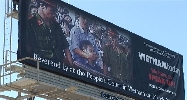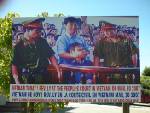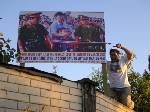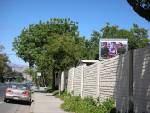 |
n°5 |
|---|
NB : Ce Périodique est diffusé afin que plus personne ne puisse dire "Oh, je ne le savais pas..." |
|---|
Sommaire : 1. Visite du Président communiste vietnamien aux Etats-Unis |
|---|
1. Visite du Président communiste vietnamien aux Etats-Unis
1.1. Afin de préparer sa visite d'une semaine aux Etats-Unis, le régime communiste vietnamien a réalisé 2 gestes 'hautement symboliques' : d'une part, sous la pression des médias du monde entier protestant contre la vague de répression des dissidents démocrates pacifiques au Vietnam, le régime a 'libéré' le journaliste Nguyên Vu Binh (voir notre édition n°4 du 15 juin 2007) et l'avocat Lê Quôc Quân (voir point 2 ci-dessous), et d'autre part, le régime a envoyé son Président Nguyên Minh Triêt en Chine pour 'présenter ses respects au Grad Frère communiste chinois' (belle preuve d'idépendance'...)
1.2. De leur côté, les Etats-Unis ont aussi 'préparé activement' cette 'première visite ... historique' d'un président communiste vietnamien aux Etats-Unis :
1.2.1. le Président Bush a rencontré, ... pour la première fois..., 4 représentants du mouvement de lutte pour la Démocratie et les Droits de l'Homme au Vietnam (voir notre édition n°4 du 15 juin 2007),
1.2.2. Madame Nancy Polesi, Présidente du Congrès Américain (House Speaker) et la Représentante Loretta Sanchez a reçu 3 représentants du mouvement de lutte pour la Démocratie et les Droits de l'Homme au Vietnam, afin de meiux comprendre les aspirations du Peuple vietnamien et de les répercuter lors de leur rencontre avec le Président communiste vietnamien (voir annexe).
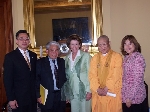 M. Do Hoàng Diêm, Pr. Nguyên Ngoc Bich, Mme Nancy Polesi, Vénérable Thich Giac Duc, Mme Loretta Sanchez
M. Do Hoàng Diêm, Pr. Nguyên Ngoc Bich, Mme Nancy Polesi, Vénérable Thich Giac Duc, Mme Loretta Sanchez
1.2.3. Une délégation du mouvement de lutte pour la Démocratie et les Droits de l'Homme au Vietnam a été reçue pendant 2 heures par de hauts dirigeants de la Maison Blanche : Mme Ellen Sauerberry, Vice-Minisnistre des Affaires Etrangères, M. Dennis Wauder, Président du Conseil National de Sécurité et Mlle Lena Nguy?n, Assistante du Vice-Ministre du Trésor . La délégation vietnamienne est composé de Me Trân Thai Van, Député de l'Etat de Californie, M. Hubert Vo, Député de l'Etat du Texas, Mlle Dina Nguyên, Conseillère Communale de Garden Grove - California, Pr Nguyên Dinh Thang, Pr Nguyên Quôc Khai, les Vénérables Thich Chân Thành et Thich Quang Thanh, M. Rong Nay, Président de la minorité ethnique des montagnards des Hauts-Plateaux du Vietnam.
1.3. le programme de la rencontre entre le Président communiste vietnamien et le Président Bush a été réduit au minimum (vu le caractère 'historique' d'une telle rencontre...) : une heure d'entretien (de 11h à midi), pas de repas offert, pas de déclaration commune après l'entretien (juste une conférence de presse où chacun a exposé ses vues - sur les relations économiques - et ses... divergences - sur le problème du respect des Droits de l'Homme au Vietnam -).
A son arrivée à la Maison Blanche , le Président communiste vietnamien a dû affronter 3.000 de ses 'compatriotes' avec les drapeaux du Vietnam Libre et des slogans hostiles. Une heure après, il est sorti par une porte dérobée, comme un voleur...
1.4. La réaction de la Communauté vietnamienne aux Etats-Unis a été à la mesure de l'événement : pendant tout le séjour du Président communiste vietnamien et partout où il a été, il a été 'accueilli' par des manifestations pacifiques de milliers de ses 'compatriotes' avec des slogans hostiles à sa politique de répression des Droits de l'Homme au Vietnam.
à Washington DC
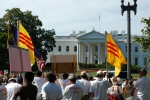
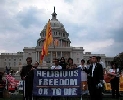
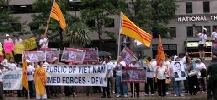
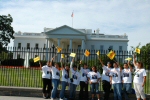
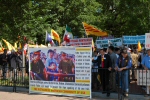
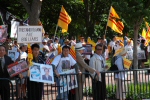
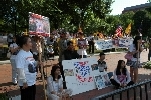
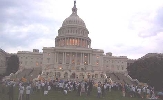
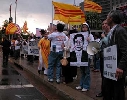
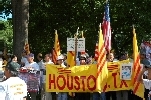

en Californie
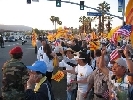
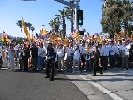
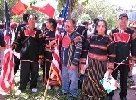
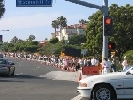
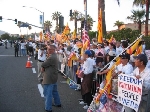

 |
San Jose, autoroute 101 |
San Jose, Senter Road |
San Jose, Tully-Quimby |
San José, Tully Road |
|---|
1.5. Résultats de cette visite : La Représentante Zoe Loegren (California) a déposé un projet de loi H.RES. 506 demandant au Président Bush de réintégrer le Vietnam dans la 'liste noire' CPC (Country of Particular Concern) et 7 Sénateurs ont signé la lettre du Sénateur Sam Brownback adressée au Président Bush lui demandant de faire pression sur le Vietnam afin d'obtenir la libération de 9 journalistes cyber-dissidents.
![]()
2. Libération de l'avocat Lê Quôc Quân : 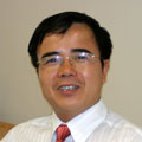
Détenu depuis le 8 mars 2007, sans connaissance du lieu, écrivain, défenseur des droits de l'homme et de la démocratie, Me Lê Quôc Quân a visité les Etats-Unis et a assisté aux séminaires de la NED peu avant mars 2007; il a été accusé de violation de l'article 79 du code pénal, visant à renverser le gouvernement. Il a été libéré sous la pression des médias du monde entier mais surtout pour 'favoriser' la visite du Président communiste vietnamien aux Etats-Unis
![]()
3. Arrestation de M. Nguyên Ba Dang : une dépêche urgente vient de nous informer que le dissident pacifique Nguyên Ba Dang, originaire de Hai-Duong, a été arrêté le 16 mai 2007 et sa famille est sans nouvelle depuis cette date. Il est incarcéré à la prison de Kinh Thi.
Interpellons nos responsables politiques pour qu'ils réagissent et interviennent en faveur de ces démocrates !
![]()
4. Depuis le 22 juin 2007, 300 habitants de Tiên-Giang manifestent devant le 2e Secrétariat du Parlement à Saigon : Bravant les persécutions propres aux régimes totalitaires communistes, plusieurs centaines d'habitants provenant de la Province de Tiên-Giang (Sud du Vietnam) ont manifesté depuis le 22 juin 207 pour protester contre la corruption et la spoliation de leurs terres dans cette Province. Encerclés par plus d'une centaines de policiers, ils sont décidés à 'aller jusqu'au bout'... et sont rejoints, de jour en jour, par d'autres manifestants.
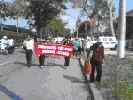
![]()
The Orange County Register : Wednesday, June 20, 2007
Orange County pushes discussion on Vietnam
Vietnamese groups meet with Sanchez and Pelosi to take up democratic reform with the nation's president
By KATHRINE SCHMIDT
WASHINGTON Rep. Loretta Sanchez and three Vietnamese community leaders met with the House Speaker Nancy Pelosi Wednesday to make sure she knows what their concerns are about that country's government before she sits down with its president today.
Nguyen Minh Triet's visit is the first of any Vietnamese president to the United States. His trip has sparked protests in Little Saigon and across the country, given what many Vietnamese Americans describe as the regime's poor human rights record and recent crackdown on pro-democracy groups and activists.
Triet will go to Dana Point on Friday after meetings today on Capitol Hill and Friday with President Bush.
The Vietnamese community leaders hoped that Pelosi and Bush would capitalize on the recent closer relations between the two countries – spurred in part by a successful trade agreement and Vietnam's entrance into the World Trade Organization last year – and push the country toward change.
They want Pelosi "to impress upon the Vietnamese president that he must respect human rights, particularly freedom of speech, freedom of religio, and association, and that they must release the peaceful dissidents," said Diem Do, chairman of the Vietnam Reform Party, an international group active in Orange County.
Do, who lives in Anaheim, joined Bich Nguyen of the National Congress of Vietnamese Americans and Thich Giac Duc, a prominent Buddhist leader from Boston in the meeting with the Speaker.
"We walked out of the building, and all felt it was an excellent meeting and an excellent opportunity," Do said. "It was a very lively exchange, and she was very, very engaged. She repeated over and over again that she will bring up the issue that we have discussed to the Vietnamese president tomorrow."
Do has been lobbying in Washington on the issue in recent weeks. He met with Bush and Vice President Cheney, representatives at the State Department and the National Security Agency, and with Rep. Ed Royce, R-Fullerton.
"I really hope that between (the Bush) meeting and this meeting today with the Speaker, we can really send a very strong message," Do said. "They are in a very good position to leverage some changes in Vietnam."
Earlier this year, the Vietnamese government arrested several of the leaders of Block 8406, a coalition of Democratic reform groups. Priest Nguyen Van Ly and lawyer Nguyen Van Dai are among those accused of spreading propaganda against the government, and could serve up to 20 years if convicted.
The House unanimously passed a resolution last month urging Vietnam to release the prisoners and reverse course on human rights.
"She's a very big person with respect to human rights, and she's very interested to see the depth of the human rights issues there," Sanchez said of Pelosi. "I think we educated her, we left her material, and she said that she was going to bring the points up with the president.
Ever since she was elected to Congress Sanchez has made trips to Vietnam and been criticized by the Vietnamese government for meeting with dissidents and arguing for increased human rights and religious freedoms.
"This is a continuous fight," Sanchez said. "We're on the right side of this issue."
Southeast Asia. Jun 27, 2007
Two sides to Triet's US visit
By John E Carey
WASHINGTON - Despite landing new agreements on trade and investment, Vietnamese President Nguyen Minh Triet's landmark official visit to the United States, the first by a Vietnamese head of state since the end of the Vietnam War in 1975, ended on a sour note and raises new questions about the direction of the relationship.
US President George W Bush, who visited Vietnam last year when Hanoi hosted an Asia-Pacific Economic Cooperation meeting, last Friday met privately with Triet at the White House. The two leaders later spoke to the international media sitting side by side in an informal discussion at the Oval Office.
Bush told reporters they discussed the tremendous economic opportunities closer bilateral cooperation has and would continue to bring to the two nations. Annual trade and cooperation between the US and Vietnam is now estimated at about US$1 billion, and big US corporations have recently made major investments in the Southeast Asian country's manufacturing sector.
But Bush also significantly broke from the conciliatory script and publicly upbraided Triet over his government's rights record.
" I also made it very clear that, in order for relations to grow deeper, that it's important for our friends to have a strong commitment to human rights and freedom and democracy ," Bush said, with Triet directly at his side. " I explained my strong belief that societies are enriched when people are allowed to express themselves freely or worship freely ."
During his week-long visit, Triet also met with congressional leaders from both political parties on Capitol Hill. Lawmakers in the meeting said he was repeatedly taken to task over recent claims by rights groups that Triet's government has increased repression of pro-democracy activists and religious leaders, some of whom have been sentenced to long prison terms on assorted anti-state charges.
Commenting on the talks afterward to reporters, Republican Congressman Ed Royce, who had attended the meeting, said human rights had been " overwhelmingly the dominant issue " of the session.
"We've got to see a stop to this conduct if this relationship is going to improve," he said, adding that Triet answered questions but was "very evasive" during the meeting.
Earlier, the US had predicated trade concessions, including support for Vietnam's membership bid to the World Trade Organization, which Hanoi achieved this January, on a demonstrable improvement on its abysmal rights record. Members of Congress had called on Bush to push Triet to end what they perceive to be widespread state-sponsored human-rights abuses, and that seems to be what finally happened on Friday.
Predictably, Triet defended his government's position to reporters before and after the White House meeting. He said he had a "direct and open exchange" on human rights with Bush, but offered no indication that he might change his government's policies or practices as a result of the discussion.
"It's not a question of improving or not," Triet said in an interview with the Associated Press, hours after meeting with Bush. "Vietnam has its own legal framework, and those who violate the law will be dealt with. The Vietnamese laws could not be 100% the same as US laws, due to the different historical backgrounds and conditions. There is a different understanding on this issue," he said through an interpreter.
The US media that covered his trip saw it differently, however. A quantitative news analysis of media coverage of Triet's visit showed that fully 70% of news outlets highlighted the human-rights issue. In Vietnamese media, however, the topic was almost entirely overlooked and the new trade and investment pact led the headlines.
Triet insisted that differences on the rights issue would not adversely affect the two countries' "larger interests". But it's no doubt significant that Bush made his public comments on such a high-profile occasion . The Washington Times in its news coverage reported that Bush "chided" Triet for Vietnam's human-rights record, religious repression and lack of democracy.
On Monday, the same publication ran an extraordinary commentary written by Triet in what could be interpreted as a mild official rebuke of Bush's earlier comments to reporters. Notably, the essay did not once mention human rights.
"Known as a new rising star in Asia, Vietnam offers an attractive business and investment environment, driven by a youthful and friendly population who are exceedingly optimistic about the future," Triet wrote. "In the international arena, Vietnam is showing itself more and more to be a responsive and reliable partner. And I know that a stable and prosperous Vietnam is also the wish of the American government and people."
In its entirety, the article reads more like a lecture to schoolchildren than a proper op-ed piece and underscores clearly his hope that bilateral trade and investment issues will, as before, continue to trump Washington's concerns about his government's poor democratic and human-rights records.
Triet wrote that "bilateral ties are built on the two countries' common interests and concerns: commerce, culture, science and technology, education, regional peace and stability, the fight against terrorism, preventing the proliferation of weapons of mass destruction, humanitarian assistance to combat HIV/AIDS, avian influenza, and the lingering wounds of war". He added: "For Vietnam, the United States is always a key partner, and Vietnam's commitment to multifaceted cooperation with the United States is sincere and steadfast."
Only time will tell what really happened behind closed doors in Washington last week , but Bush's and Triet's mild spat in the media indicates the bilateral relationship could be in for rocky time ahead, particularly if Bush was serious about prioritizing democracy and human rights on par with economic matters in his government's official dealings with Vietnam's communist rulers.
John E Carey is the former president of International Defense Consultants, Inc. He writes frequently on international issues from Washington, DC. His daily weblog is Peace and Freedom .
![]()
vendredi 22 juin 2007, 21h31 : Bush pousse au respect des libertés au Vietnam lors d'entretiens historiques
Par P. PARAMESWARAN
WASHINGTON (AFP) - George W. Bush a exhorté vendredi son homologue Nguyen Minh Triet à faire respecter les droits de l'Homme dans son pays, lors de la première rencontre aux Etats-Unis entre des présidents américain et vietnamien depuis la fin de la guerre du Vietnam.
Les deux hommes ont souligné l'approfondissement des relations entre les deux pays, économiques surtout, plus de 30 ans après la fin de la guerre. Mais ils ont aussi admis leurs divergences sur la liberté d'expression ou de religion au Vietnam.
Plusieurs centaines de personnes, 2.000 selon les manifestants, dénonçaient au même moment devant la Maison Blanche les atteintes aux libertés au Vietnam.
"Libérez tous les prisonniers politiques", scandaient les manifestants sous des pancartes montrant un soldat muselant Nguyen Van Ly lors du procès de ce prêtre catholique.
"J'ai expliqué au président que nous voulons de bonnes relations avec le Vietnam. Et nous avons effectivement de bonnes relations économiques", a dit M. Bush à l'issue d'entretiens dans le Bureau ovale. "J'ai aussi signifié très clairement que, pour que les relations s'approfondissent, il est important que nos amis s'engagent fermement en faveur des droits de l'Homme, de la liberté et de la démocratie" , a-t-il poursuivi.
Si les échanges commerciaux s'intensifient et les relations s'améliorent comme l'a montré la visite du président américain au Vietnam en novembre 2006 après celle de son prédécesseur Bill Clinton en 2000, M . Bush montre du doigt le régime communiste de parti unique, en particulier depuis le récent renforcement de la répression contre les dissidents.
M. Bush a cité le Vietnam dans un grand discours sur l'état des libertés dans le monde le 5 juin.
Une porte-parole de la Maison Blanche , Dana Perino, a indiqué après la rencontre que ce sujet , une " forte préoccupation pour le président ", avait été l'un des premiers abordés par M. Bush avec son homologue vietnamien.
Et nombre d'organisations avaient réclamé à M. Bush qu'il déclare les agissements du régime vietnamien inacceptables.
M. Triet a parlé d'un "échange de vues direct et ouvert" sur la question.
"Notre approche consiste à renforcer le dialogue (entre le Vietnam et les Etats-Unis) pour une meilleure compréhension mutuelle", a-t-il dit.
"Nous sommes aussi déterminés à faire en sorte que ces divergences n'affectent pas nos intérêts généraux plus larges", a-t-il dit.
M. Triet, venu aux Etats-Unis surtout pour affaires comme l'a illustré sa visite mardi à la Bourse américaine, a insisté sur le renforcement des relations bilatérales et des échanges économiques.
"Je voudrais vous dire que le Vietnam aujourd'hui est un pays stable, pacifique et amical", a-t-il dit, dans un appel clair aux Américains à investir dans une économie à la vitalité déjà considérable.
M. Triet a rencontré des hommes d'affaires américains au cours de son séjour. Les deux pays ont signé jeudi un pacte commercial et d'investissement, préludant un accord complet de libre échange.
Selon des chiffres vietnamiens, les Etats-Unis sont le premier marché à l'exportation du Vietnam et les échanges ont plus que quintuplé depuis 2001.
Plus de trente ans après la fin du conflit, les séquelles de la guerre du Vietnam ne sont pas effacées. M. Bush a salué la coopération du Vietnam pour récupérer les dépouilles de soldats américains. M. Triet a exprimé sa reconnaissance au Congrès pour l'allocation récente de fonds destinés à pallier les effets de "l'agent orange", redoutable défoliant utilisé pendant la guerre.
